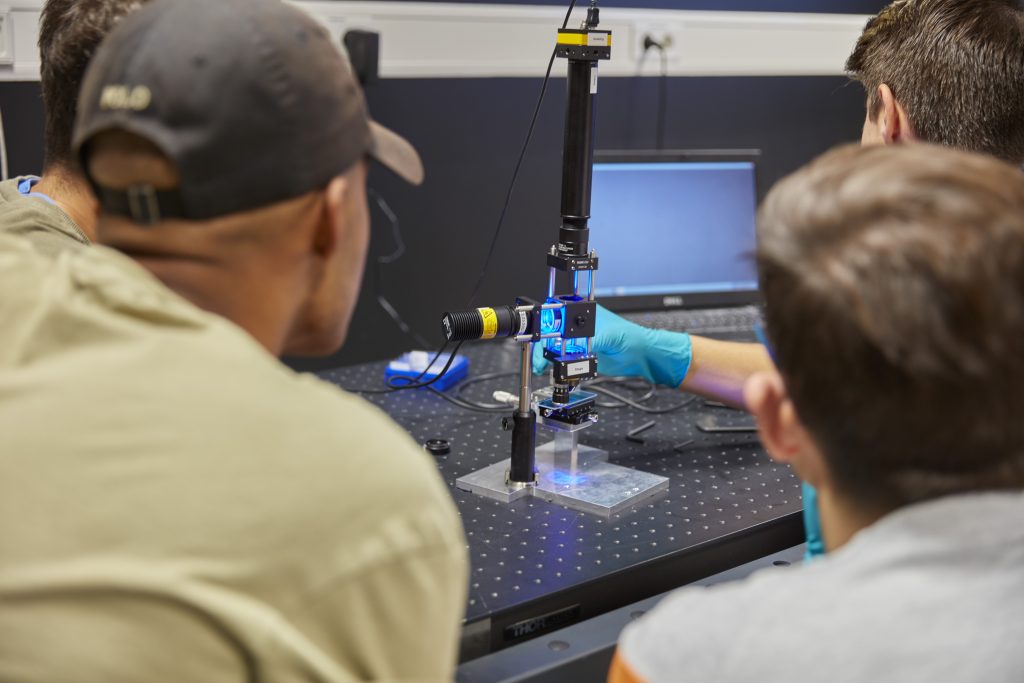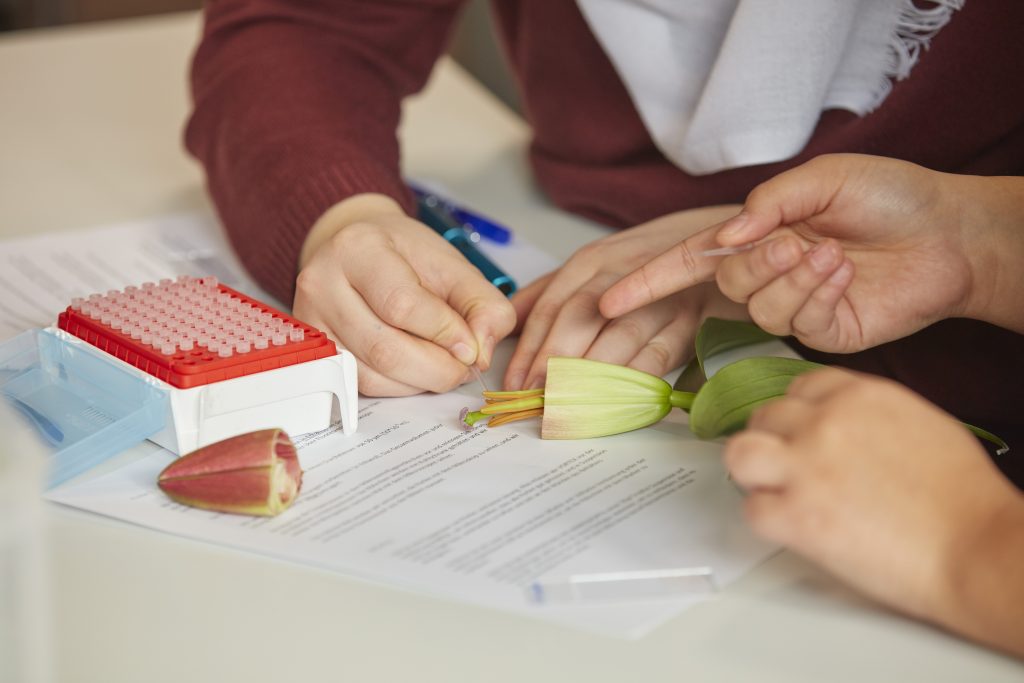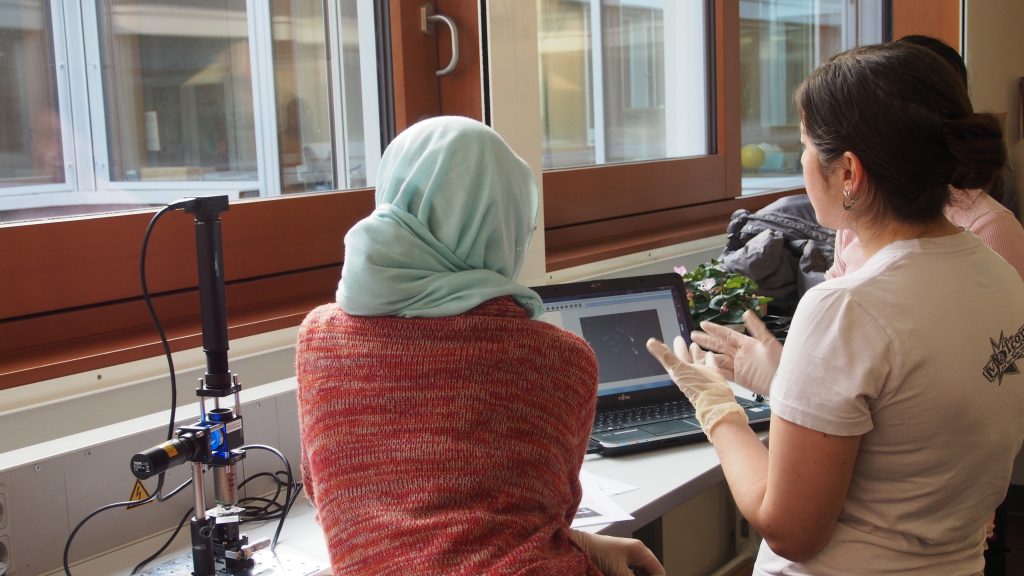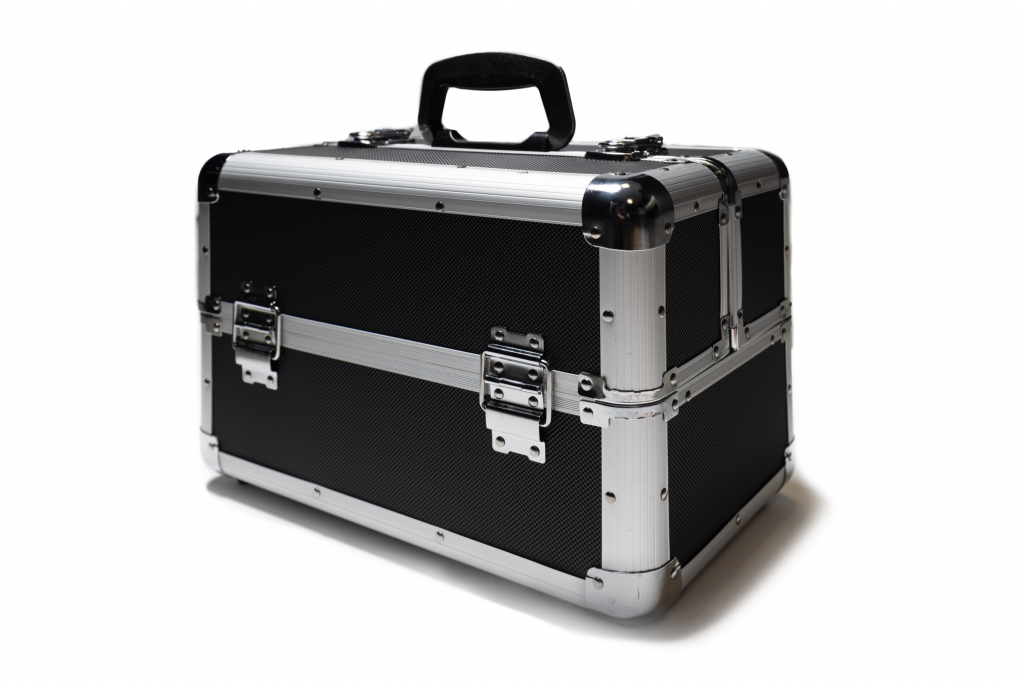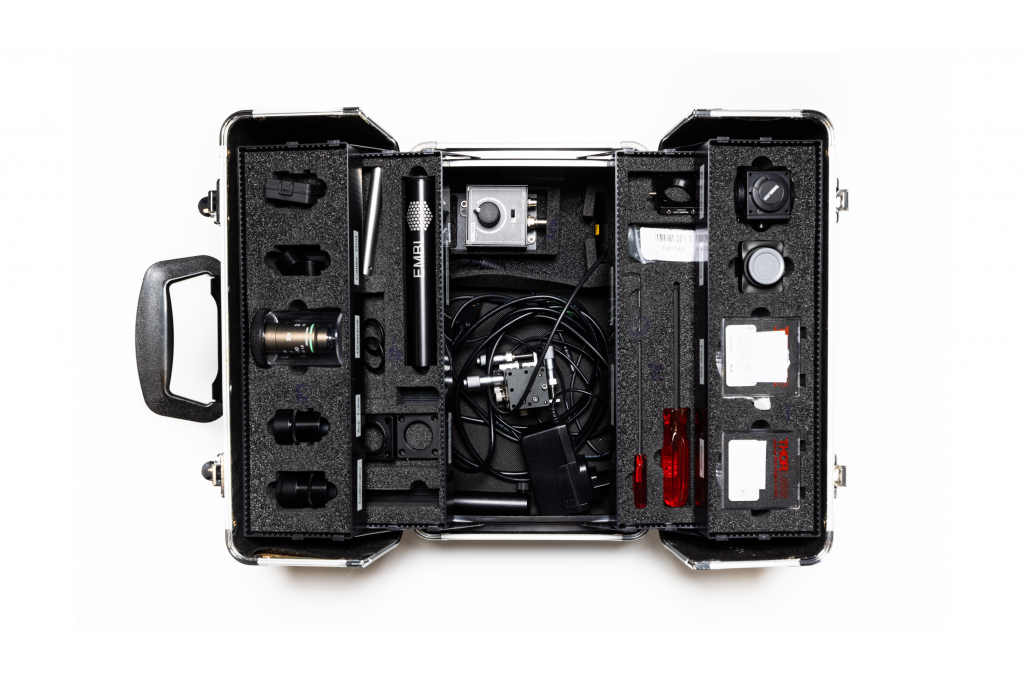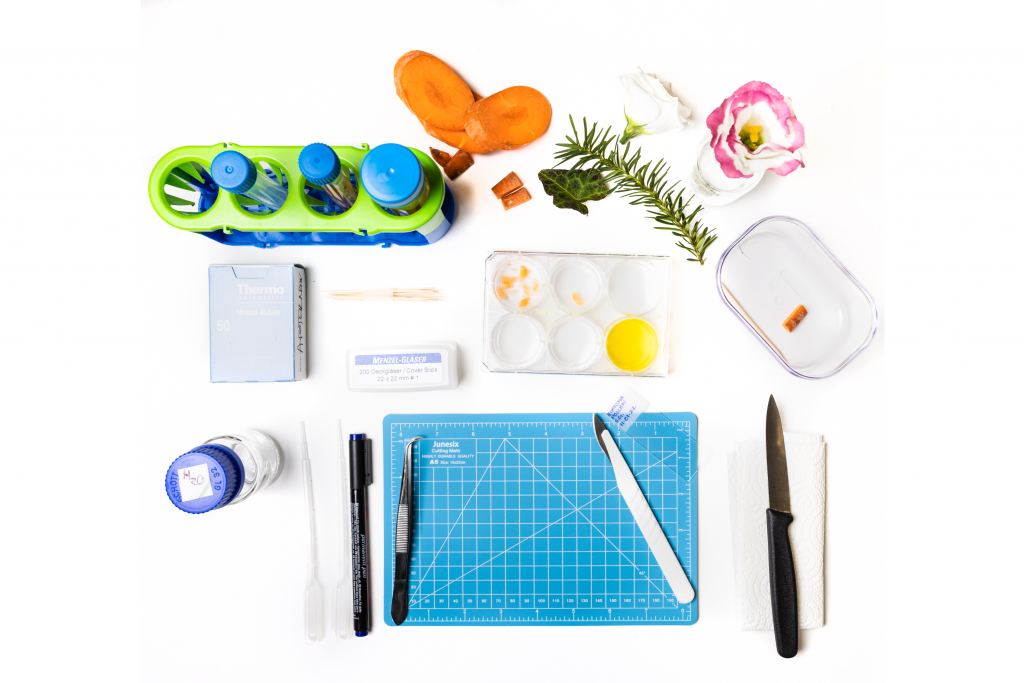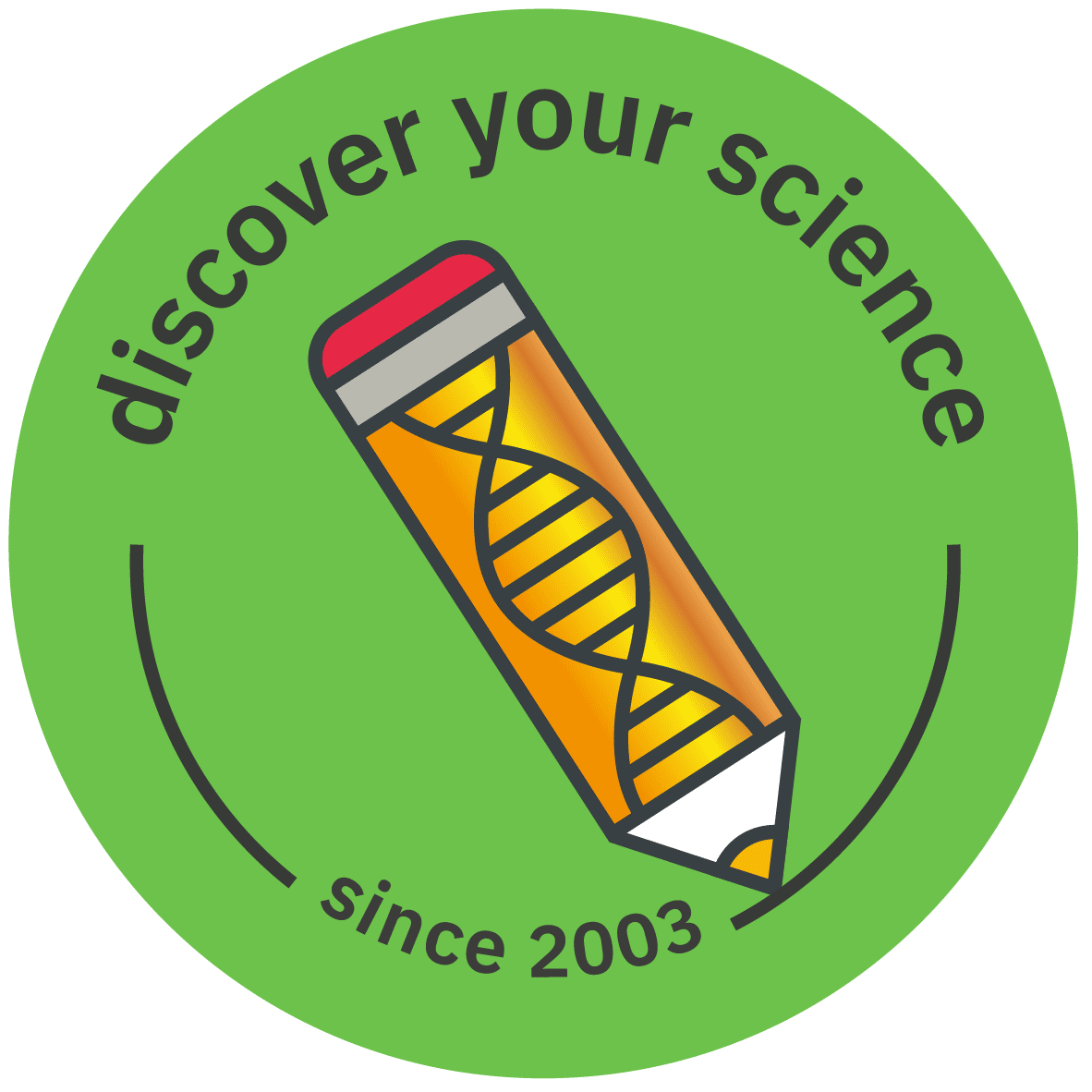Microscope in Action (MiA) brings fluorescence microscopy to schools.
It is an educational microscopy kit designed to help educators inspire and fascinate students through active STEM learning. It is flexible, adaptable, and has curriculum links to physics and biology with connections to chemistry, technology as well as the arts. It can be used in formal and informal learning environments with students 14+.
Learning goals
- Assemble the learning microscope and understand the concept of fluorescence microscopy
- Know applications of fluorescence microscopy in the natural sciences and beyond
- Understand the connection between research, technology and applied sciences
- Apply interdisciplinary and interconnected thinking
- Develop soft skills- teamwork and communication
Coming up: The kits will be available for lease by educators outside of Germany. The fluorescence learning microscopes will also be available for purchase through EMBLEM Technology Transfer GmbH.
MiA kit
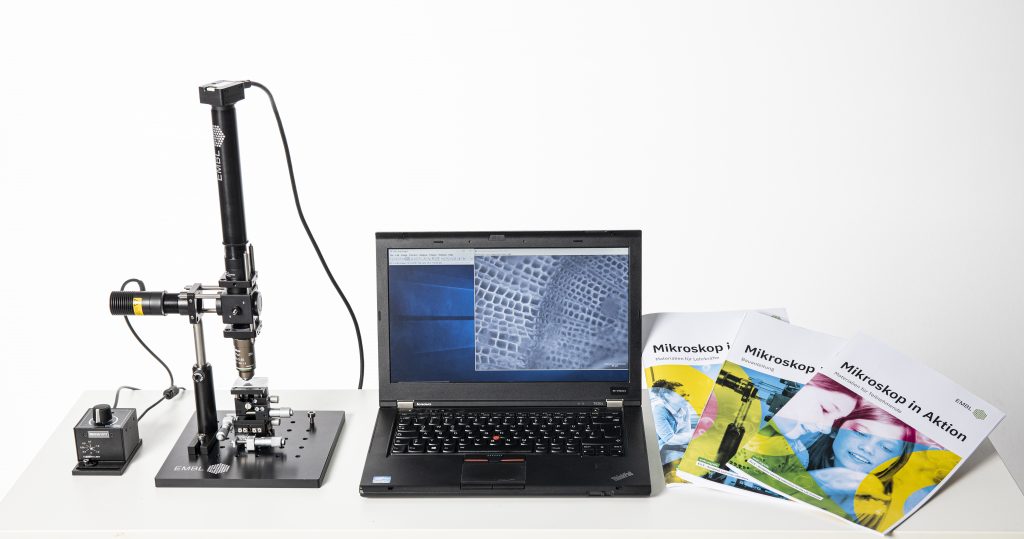
Overview
Microscope in Action (MiA) offers an engaging hands-on STEM learning experience by providing access to a research-grade instrument. It is built on the pedagogical approach of active learning and brings into focus the interdisciplinary nature of science by combining concepts from both physics and biology. The MiA design invokes inquiry-based active learning, collaborative work and helps students understand how technology and research go hand-in-hand.
In MiA workshops, students build a fluorescence microscope from its basic optical, mechanical, and electronic parts. This allows students to get up-close with each individual component and through the process of active inquiry understand its function as they connect the different parts to build a fully functioning fluorescence microscope. The self-built microscope is then put into action through ready-to-use exercises for simple sample preparation, staining, imaging and image analysis. This facilitates the exploration of biological topics and helps the students develop interdisciplinary and interconnected thinking.
Design principle
Modular- The modular structure provides flexibility allowing educators to design an MiA workshop to fit their classroom timetables with varying durations and subject linked learning goals.
Adaptable – Educators can easily adapt and customise the learning experience/goals for different learning environments, levels and to their teaching methodology and approaches.
Accessible – MiA provides varied topical access points and resources which stimulate and engage diverse learners and learning styles
Curriculum links and more
It currently directly links to German and other national secondary school curricula in physics, biology, interdisciplinary natural sciences, and technology. It also offers complementary content for chemistry, bioinformatics and visual arts for ages 14–19+. The resource can also be adapted as a training tool for other training and educational levels- including bachelors, masters, scientists and teacher training courses.
Biology
- Microscopy: alternatives to light microscopy, optics of a (fluorescence) microscope, preparation of biological samples
- Biochemistry, Molecular and Cell Biology: working with a micropipette, preparing dilutions, autofluorescence, Green Fluorescent Protein, applications of fluorescence microscopy in biological research
Physics
- Optics: collimation, magnification
- Fluorescence
Chemistry
- Luminescence/ fluorescence: differences between types of luminescence, energy states
- Stains and chromophores
Computer science
- Data and image analysis: using image analysis software such as ImageJ/Fiji
Natural sciences & technology studies
- Linking natural science and technology
Impact on students learning
Students who have taken part in MiA workshops show a good understanding of subject-related conceptual knowledge, marked improvement in practical and experimental skills, and development of interdisciplinary thinking and soft skills. Our assessments also indicate increased learning motivation, and high engagement and enjoyment towards the topics covered even among students with low science interest.
Microscope in Action online course
Wish to learn more? Sign up for our online course in German.
Covered in the course:
- Overview of key features of Microscope in Action
- The Fluorescence Learning Microscope
- Educational package- learning, teaching and supporting materials
- Lease service and agreement
- Implementation in class (among others: curriculum connections, teacher interviews)
Sign up for the online course by filling out the registration form here.
Please note that the course language is German. Please contact us via email to express your interest for an English info session.
Lease service
You can lease, free of charge, the MiA kits for your classroom. The lease service is currently offered to German educators from secondary schools, Pädagogischen Hochschulen (universities of education) and out-of-school learning spaces.
Coming up – Lease service will be expanded to make the kits available to educators outside of Germany.
Rental period: 2-6 weeks
Overview of a standard lease package
- Fluorescence Learning microscope (research-grade) – maximum 6 microscopes
- Access to the learning and teaching materials
- Training session (1 hour)
Optionally you can include in your lease:
- Laptops- Maximum 6 laptops
- Experimental kit with materials for sample preparation – Enough for maximum of 24 participants
Lease process
- We recommend starting the lease process as soon as possible, at least 8-12 weeks before you wish to use the kits. It is not possible to accommodate last minute requests, especially if you are a first time lessee.
- Complete the lease application form and read the summary of the lease agreement (found below) to make sure you are able to adhere to all necessary rules. You can contact us if you have any questions or concerns about this agreement.
- EMBL will share confirmation of your application along with the lease agreement. You will have a few weeks to go over the agreement in detail and return it to us signed (a digitally signed or scanned copy is accepted).
- Attend a Training session: For 1st time lessees’ it is compulsory to attend a training session before you can start working with the equipment. This session can happen before or after you collect the equipment and online or in-person.
- You arrange and assume the cost and responsibility for pick up and return of the equipment- By car or transport company
Lease application form
To start the lease process please complete the application form which is currently available in German.
We strongly recommend attending the online course before leasing the resource for the first time. Sign up by filling out the registration form here.
Lease agreement
We are very happy to see how many schools are interested in our Microscope in Action project. To ensure the smooth implementation of the lease, we ask each of you to enter into an agreement with EMBL. Please have a look at the basic principles of the lease process and agreement here.
Training session
These sessions are individually scheduled and will take place online or in-person. They will help you get a deeper understanding of the Fluorescence Learning Microscope and address tips, tricks and potential pitfalls. As preparation for the training we strongly recommend you familiarise yourself with the resource through the online course.
Content of the session:
1. Troubleshooting and safety tips for microscope assembly
2. Our recommendations for how to set up a MiA workshop in your settings
3. Q&A session
Buy the DIY Microscope
The fluorescence learning microscopy kit will be available for purchase through EMBLEM Technology Transfer GmbH.
What’s included in the purchase kit?
- The Fluorescence Learning Microscope (FLM)
Additional items in case:
- Prepared sample slide set with 3 slides
- Calibration grid
- Access to the complementary and comprehensive package of learning, teaching and facilitation materials
- Helpdesk support
Publications/Articles
Research article
Microscope in Action: An Interdisciplinary Fluorescence Microscopy Hands-on Resource for Schools | G. Paci; E. Haas; L. Kornau; D. Marchetti; L. Wang; R. Prevedel; A. Szmolenszky | The Biophysicist, 7 October 2021
Educational article
Colours in the dark: fluorescence microscopy for the classroom | H. Arevalagam, S. Gaikwad | Science in School, issue 58, 1 June 2022
EMBL Annual Report 2021
Feature article: “Seeing more, learning more”, 29 June 2022
EMBL news
“Microscope in Action” featured at German Science on Stage festival, EMBL Science Education and Public Engagement news, 6 September 2021
Building microscopes to learn biology, EMBL news, 10 February 2020
“Microscope in Action” goes into action, EMBL Science Education and Public Engagement news, 28 November 2019
Science in a suitcase, EMBL news, 12 March 2018
Kickstart “Von Natur bis Technik – Mikroskope in Aktion”, EMBL Science Education and Public Engagement news, 25 October 2017
FAQs
For answers to Frequently Asked Questions (FAQs), please click on the appropriate category below.
General questions about MiA
- Is it safe to give the Microscope to my students?
- Yes, the microscopes are safe, made of high quality, durable materials suitable for repetitive use by novice users. It is essential to go through the safety instructions with the students BEFORE starting with the assembly process. If necessary repeat the safety instructions for each sub-system.
- What is the size and weight of one microscope case?
- Each microscope comes in a robust case. All individual microscope parts are placed into foam inserts, with specific cut-outs for each individual part. There are two different types of cases:
- Dimensions of a microscope case for one microscope: LxWxH = 37.5 × 23.5 x 26.5 cm; weight = 6 kg
- Dimensions of a microscope case for two microscopes: LxWxH = 43 × 55 x 33 cm; weight = 16 kg (without laptops)/ 20 kg (with laptops)
- Are there specific times to collect and return the equipment?
- 09.00- 12.00 or 13.00-17.00 as agreed upon with EMBL.
- What are the technical Aspects/Specs of the Fluorescence Learning Microscope
- 20x Objective lens
- Nominal wavelength = 470 nm (blue)
- Bandwidth of filters – filter set for GFP
- LED: 470 nm, 760 mW (Min) Mounted LED, 1000 mA
- LED driver up to 1200 mA15 V, 2.4 A Power Supply Unit
- Camera: CMOS, 2048 × 1536, monochrome, USB connection
EMBL Science Education and Public Engagement
EMBL Heidelberg
Meyerhofstraße 1
69117 Heidelberg
Germany
Tel: +49 6221 387-8805
Fax: +49 6221 387-98252
Email us
